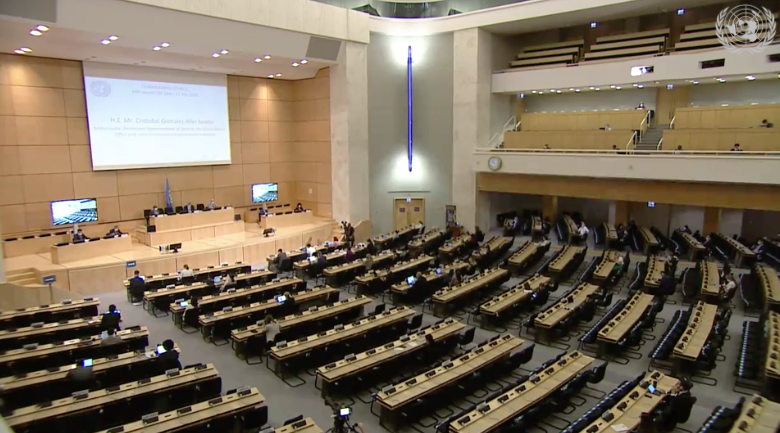16.07.2020 - 15:12
|
Actualització: 16.07.2020 - 17:12
Amnesty International have demanded that Spain commit to the United Nations (UN) to reform the crime of sedition, which has ‘unduly restricted’ the freedom of expression of Jordi Sànchez and Jordi Cuixart. The two organizations have denounced the ‘unfair’ imprisonment of Sanchez and Cuixart during the session of Universal Periodic Review of Spain by the United Nations Human Rights Council.
Spain’s Permanent Representative to the UN, Cristóbal González-Aller Jurado, presented his responses to criticism and suggestions on respect for human rights received by other states in January. You can consult the Spanish response report here (in Spanish).
After reading the Spanish report, states and civil organizations took the floor, insisting on the need to take action. Òmnium Cultural, through the European Network for Linguistic Equality, has called for the release of political prisoners in Spain and ‘measures to respect the freedom of peaceful assembly’.
‘Spain continues to restrict freedoms. Many cannot exercise their rights, such as Jordi Cuixart ‘, said the representative of the European Network for Linguistic Equality, Davyth Hicks, who also called for an investigation into the’ misconduct of police action during the 1-O referendum and the demonstrations against the Spanish Supreme Court ruling on Catalan leaders.
Full respect
After these interventions, the Spanish representative spoke again and responded to the criticism received. Regarding those who referred to freedom of expression and association, he said that they were ‘absolutely full’. ‘The Spanish system has been endorsed on many occasions by the European Court of Human Rights,’ he said, mentioning the case of exiled singer Valtònyc as an example: ‘Mr Arenas was convicted in Spain of exalting terrorism. In July 2019, the ECHR rejected his lawsuit against him, which shows that the Spanish judiciary complied with all international standards. ‘
The fact is that the ECHR did not actually go into the substance of the matter and rejected it for formal reasons, as Valtònyc did not exhaust its domestic options before appealing to the ECHR, which is intended as a court of last resort.


